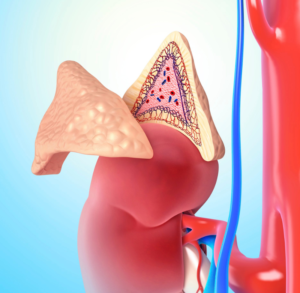Section 7e: Endocrine – Hyperadrenal

Anatomy and Physiology
The adrenal glands, located on top of each kidney, are essential components of the endocrine system. They produce hormones such as cortisol and adrenaline and are responsible for the body’s stress response. Hyperadrenalism, or an overactive adrenal gland, results in excessive secretion of these hormones.
Importance to Overall Health
Maintaining proper adrenal function is vital for managing stress, regulating metabolism, and supporting immune function. Hyperadrenalism can lead to an overstimulated stress response, affecting various physiological processes.
Dysfunction
Hyperadrenalism can result from conditions such as Cushing’s syndrome or adrenal tumors, leading to symptoms like weight gain, high blood pressure, and mood swings. Chronic overstimulation of the adrenal glands can contribute to metabolic imbalances and immune system suppression.
Nutritional Component
Key hormones produced by the adrenal glands include cortisol and adrenaline.
- Cortisol Synthesis: The adrenal cortex produces cortisol, a hormone that regulates metabolism, immune response, and the stress response. Nutrients such as vitamin C, B-vitamins, and adaptogenic herbs influence cortisol synthesis.
- Adrenaline Production: The adrenal medulla releases adrenaline, a hormone that prepares the body for the “fight or flight” response. Nutritional factors, including amino acids and certain minerals, play a role in adrenaline production.
Science Behind Nutritional Influence
Nutrients and dietary choices significantly impact the nutritional biochemistry of the hyperadrenal endocrine system:
- Vitamin C: Essential for adrenal function and the synthesis of cortisol. Citrus fruits, strawberries, and bell peppers are good sources of vitamin C.
- B-Vitamins: Play a role in energy metabolism and support the adrenal glands. Whole grains, meat, and leafy greens are rich in B-vitamins.
- Magnesium: Involved in the regulation of cortisol release and supports overall adrenal health. Nuts, seeds, and leafy greens are good sources of magnesium.
- Adaptogenic Herbs: Such as ashwagandha and rhodiola, may help modulate the stress response and support adrenal function.
- Amino Acids: Building blocks of proteins, amino acids are crucial for hormone synthesis. Protein-rich foods like meat, fish, and dairy contribute to amino acid intake.
Supplements
Explore the potential benefits of glandular supplements tailored to your individual health profile by setting up a free 10 minute call with Dr. Kneessi. Otherwise here are some of the most common supplement recommendations for supporting this system. Most of the above nutrients are also the most recommended supplements.




